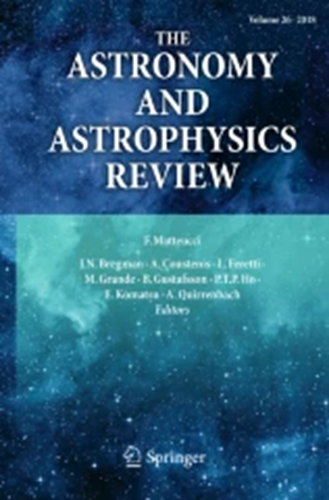许多水母星系。低红移星团中的无线电尾
IF 27.8
1区 物理与天体物理
Q1 ASTRONOMY & ASTROPHYSICS
引用次数: 12
摘要
在本文中,我们展示了低红移星团(z<0.05)中的水母星系的大样本,通过LOFAR两米巡天(LoTSS)的120-168 MHz无线电连续体识别。从29个x射线探测到的SDSS星系团及其光谱成员的母样本中,我们视觉上识别出95个恒星形成的LoTSS水母星系,它们具有144 MHz的射电尾巴。所有星系的恒星形成速率(SFRs)和恒星质量都是由SED拟合得到的。对于每个水母星系,我们确定了相对于星团中心的尾部方向,并量化了144 MHz形状不对称的射电尾部的突出。在仔细考虑了红移相关的选择效应后,我们发现水母星系的频率在星团之间相对恒定。LoTSS水母星系优先被发现在小的星团中心半径和在其主星团内的大速度偏移处,并且具有远离星团中心的射电尾巴。与“正常”星团星系和孤立场星系相比,这些星系也显示出增强的恒星形成,但通常落在L144MHz - SFR关系的散射范围内。在这项工作中确定的LoTSS水母星系的性质与冲压压力剥离的预期完全一致。这个水母星系的大样本将对进一步限制附近星系团的冲压压力剥离和恒星形成淬火有价值。我们表明,LOFAR是一种强大的仪器,可以在非常宽的区域内识别ram压力剥离星系。下一步,我们将推动对水母星系的搜索,超越这个最初的星团样本,包括对星系群制度的全面调查。本文章由计算机程序翻译,如有差异,请以英文原文为准。
LoTSS jellyfish galaxies. I. Radio tails in low redshift clusters
In this paper we present a large sample of jellyfish galaxies in low redshift clusters (z<0.05), identified through 120-168 MHz radio continuum from the LOFAR Two-metre Sky Survey (LoTSS). From a parent sample of 29 X-ray-detected SDSS galaxy clusters and their spectroscopic members, we visually identify 95 star-forming, LoTSS jellyfish galaxies with 144 MHz radio tails. Star formation rates (SFRs) and stellar masses are obtained for all galaxies from SED fits. For each jellyfish galaxy we determine the tail orientation with respect to the cluster centre and quantify the prominence of the radio tails with the 144 MHz shape asymmetry. After carefully accounting for redshift-dependent selection effects, we find that the frequency of jellyfish galaxies is relatively constant from cluster to cluster. LoTSS jellyfish galaxies are preferentially found at small clustercentric radius and large velocity offsets within their host clusters and have radio tails that are oriented away from the cluster centre. These galaxies also show enhanced star formation, relative to both 'normal' cluster galaxies and isolated field galaxies, but generally fall within the scatter of the L144MHz - SFR relation. The properties of the LoTSS jellyfish galaxies identified in this work are fully consistent with expectations from ram pressure stripping. This large sample of jellyfish galaxies will be valuable for further constraining ram pressure stripping and star formation quenching in nearby galaxy clusters. We show that LOFAR is a powerful instrument for identifying ram pressure stripped galaxies across extremely wide fields. Moving forward we will push the search for jellyfish galaxies beyond this initial cluster sample, including a comprehensive survey of the galaxy group regime.
求助全文
通过发布文献求助,成功后即可免费获取论文全文。
去求助
来源期刊

The Astronomy and Astrophysics Review
地学天文-天文与天体物理
CiteScore
45.00
自引率
0.80%
发文量
7
期刊介绍:
The Astronomy and Astrophysics Review is a journal that covers all areas of astronomy and astrophysics. It includes subjects related to other fields such as laboratory or particle physics, cosmic ray physics, studies in the solar system, astrobiology, instrumentation, and computational and statistical methods with specific astronomical applications. The frequency of review articles depends on the level of activity in different areas. The journal focuses on publishing review articles that are scientifically rigorous and easily comprehensible. These articles serve as a valuable resource for scientists, students, researchers, and lecturers who want to explore new or unfamiliar fields. The journal is abstracted and indexed in various databases including the Astrophysics Data System (ADS), BFI List, CNKI, CNPIEC, Current Contents/Physical, Chemical and Earth Sciences, Dimensions, EBSCO Academic Search, EI Compendex, Japanese Science and Technology, and more.
 求助内容:
求助内容: 应助结果提醒方式:
应助结果提醒方式:


